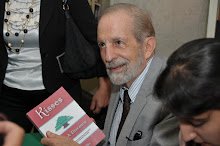In gearing up to halt any late surge by presidential
candidate Bernie Sanders, traditional Democrats supporting Hillary Clinton are
resorting to tactics that mimic the Republican attempt to stop Trump.
As an example, many Republicans have stated that Trump is
not really a Republican but a Johnny-come-lately who is masquerading as a
conservative. This contention is supported by photos of
him cozying up to
Democrats such as Hillary herself. On the other side, Clinton has claimed that
Sanders isn't really a Democrat, pointing to his Independent status as proof.
She, however, claims to have been a Democrat all her adult life—meaning
that her campaigning for Barry Goldwater was a childhood infatuation. Reporters should
have asked Hillary to define "adult" because she was an active
Republican until after she turned twenty-one. Perhaps she matured late
because anyone who has turned eighteen is legally considered an adult.
Another example of this tactic is how Donald Trump is roundly
castigated for being out of the "mainstream," i.e. bucking the
establishment." He will destroy the Republican Party many partisans complain.
His ideas, such as making our allies pay for their own defense, is "pie in
the sky." On the Democratic side, Bernie Sanders is roundly booed for
being a "Socialist," whatever that means. And the media, which exhibits a biased view in the matter, continues to mention this "flaw"
at every opportunity—even going so far as to predict that a
"Socialist" has no chance of being elected president in these United
States.
Clinton, for her part, often mentions Sanders' policies as
being un-implementable while pointing out that there is a vast
difference between promises and actually getting things done. In particular
"free college" and breaking up the large banks are not going to happen.
Her supporters took up this clarion call and derided the notion that anything
worth anything was free. Once Sanders' idea took root, Clinton softened
her stance and began talking about "free" Community Colleges. In
fact, free education existed for nearly a century after federal land-grant
colleges were first established in 1862. The radical rise in education costs is
a relatively modern, post WWII phenomenon.
Finally, Trump's opponents mention the lack of higher education
as an identifier of his supporters (alluding to a low IQ). Opinion polls soon began
emphasizing the education levels and ages of the electorate to emphasize this
point. Clinton supporters similarly pointed out that Sanders' supporters
were mostly young people who were naive and "uninformed" about the
political process. They were being taken in by a lack of understanding of "how
politics works." So, given that you can't really change things, don't
bother trying, it's a fool's errand. Both sides refuse to acknowledge that these candidates are capitalizing on a general disaffection with politics
as usual—e.g., the STATUS QUO.
Establishment Republicans and Democrats are deathly afraid that their ability to
manipulate the system that has served them so well might be destroyed if these
types of candidates are permitted to be taken seriously. Perhaps it is time to
destroy the old system and begin anew.





1 comment:
Are both political parties the same?
Post a Comment